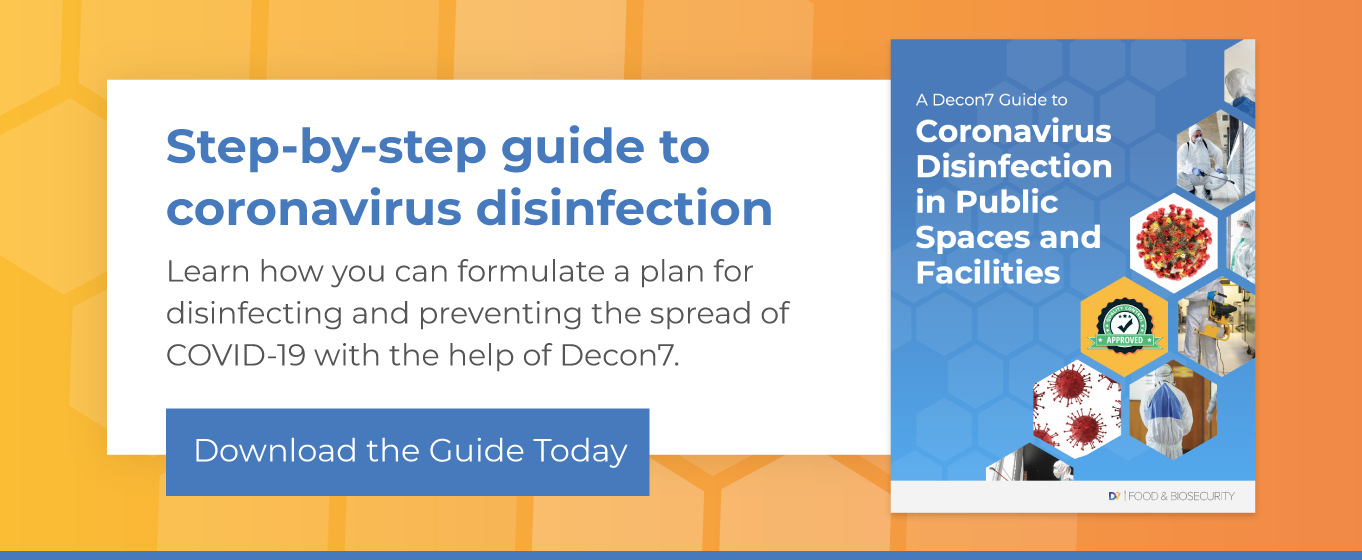.png?width=900&name=Decon7%20Ken%20Dreyer%20(2).png)
We’re pleased to announce the addition of Ken Dreyer to the Decon7 team as VP of Food and Biosecurity. We conducted a brief interview to get to know him better, and this is what we learned.
Background Basics
Ken joined the military immediately after high school and served in the Army while earning his degree. He then started working in the restaurant industry and was drawn to the food safety aspects of his work, ultimately becoming a trainer, tester, and facility auditor.
When he transitioned to Madison Chemical, his education accelerated rapidly while working hands-on with some of the largest food producers in the country. During his tenure there, he became involved with United Fresh as part of their Food Safety and Technology Council. He participated in United Fresh’s Produce Safety Immersion program, writing various papers and contributing to the recently released Listeria guidance. He has also been heavily involved in the marketing efforts at Madison Chemical, writing press releases and updating or creating various marketing materials.
Industry Experience and Expertise
At Madison Chemical, Pilot, and Bob Evans, Ken’s roles ranged from hands-on work as a technical representative to higher level management roles in sales and business development. In addition to his various contributions to United Fresh, he works with the Produce Marketing Association and the Southwest Meat Association.
Role at Decon7
As the new VP of Food and Biosecurity at Decon7, Ken’s breadth of experience in both hands-on and behind-the-scenes work serves him well. His responsibilities include managing the entire team, ranging from those who provide technical support for customers doing deep cleans to the sales development representatives who seek out new business. He also takes the lead on training all of the teams in the food and biosecurity sector to maintain industry standards.
What Does Food Safety and Biosecurity Entail?
Food safety and biosecurity encompasses risk management in both live production—hatcheries, barns, farms, and so on—and food processing facilities in order to protect plants, animals, employees, and consumers. Every step in the supply chain, from raw ingredient production to delivery and storage, has a potential impact on food safety, which is why maintaining strict sanitation protocols is important.
The Draw to Decon7
Ken pursued a career with Decon7 because he has a keen interest in the public safety and defense aspects of the business and he recognized other like-minded individuals in the organization. As someone who is always trying to improve the way things are done, he found Decon7’s genuine approach to innovation and adaptability appealing. This was also evident throughout the hiring process, when the team demonstrated their interest in getting to know him, rather than just going through a formal checklist of questions. Just one month into his new position, Ken already felt like part of the Decon7 family.
Biggest Challenges in the Food Safety Industry
It’s not surprising that COVID-19 is currently the biggest challenge in the food industry, but Ken recognizes the silver lining. A new focus on food safety has caused teams in every part of the industry to rise to the challenge of meeting rigorous standards. In addition to increased attention on cleaning production areas, businesses are prioritizing employee health and ensuring that common areas are regularly treated with an EPA-registered disinfectant.
The constantly changing regulatory landscape is a challenge for the food safety industry because businesses must keep up with the latest regulations. Food outbreaks can happen at any time, regardless of what else is happening in the world, so there is always an underlying motivation to be proactive rather than reactive. In his experience, Ken notes, the most successful organizations are those that share knowledge with peers in order to raise up the entire industry and protect employees and consumers.
How Those Challenges Relate to Decon7
Unlike many other types of disinfectants and sanitizers, D7 can be used in all areas, not just food processing zones. The product can be used for multiple types of applications across different industry sectors, including food processing, public safety, defense, and commercial and residential use. As Ken says, “You can use it to deep clean the inside of a meat packing facility, but you can also use it to spray or wipe down your office, or even your home or a hotel room.” This makes the company uniquely positioned to have an impact on multiple industries.
What Makes D7 Different
Ken believes versatility is D7’s primary strength. Not many other products can be used in so many applications without changing the formula, especially with different methods, such as liquid, spray and foam. Whether used in a spray bottle to disinfect a home countertop or applied at a turkey farm using an industrial foamer, the benefits remain the same.
As an EPA-registered disinfectant for use against SARS-CoV-2 (COVID-19), D7 offers many advantages over other alternatives. D7 has low toxicity and low corrosivity, making it safe to apply to a range of materials using minimal PPE. The product also kills viruses at the RNA level, while others only dilute it. With a high log kill, D7 is more effective than bleach and many other popular disinfectants.
With Ken’s depth and breadth of experience in the food safety and biosecurity industry, we’re excited to continue growing the use of D7 within the sector. To learn more about how you can use D7 in your facility, read The Decon7 Guide to Coronavirus Disinfection in Commercial, Industrial, and Public Facilities.

